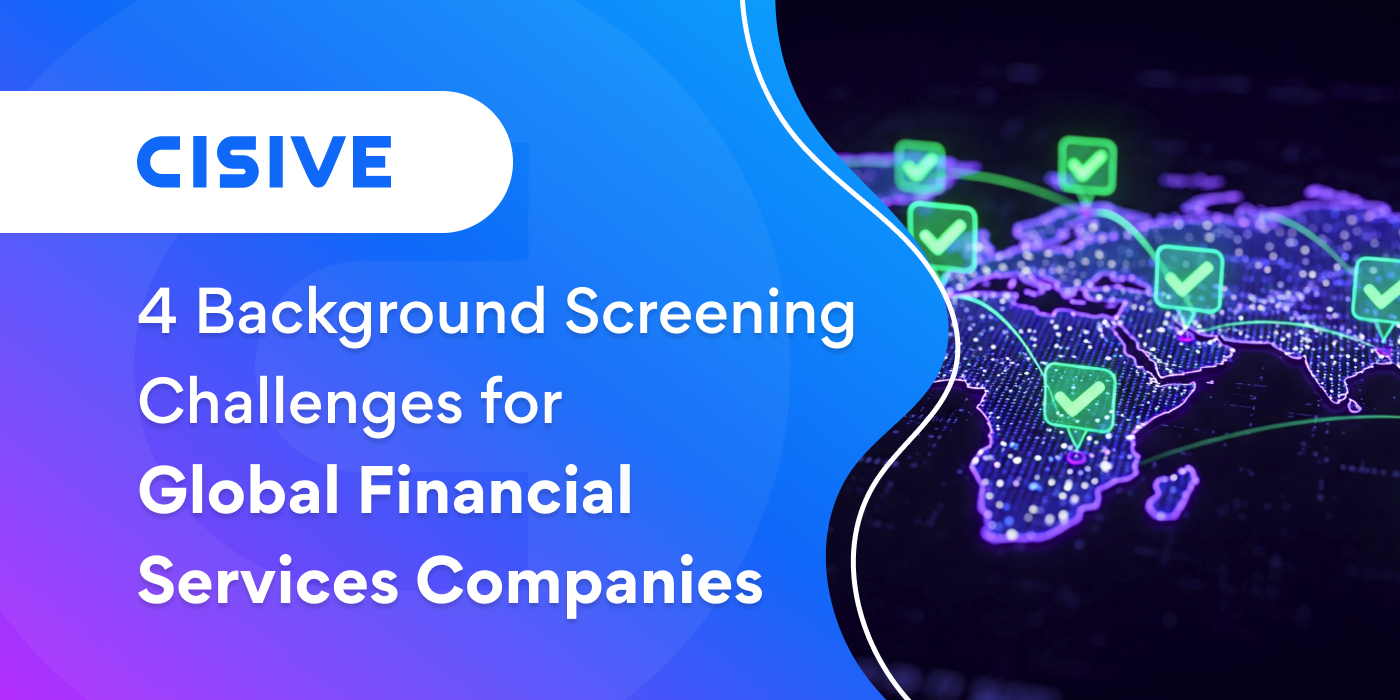

The office of the Federal Deposit Insurance Corporation (FDIC) was created by the Banking Act of...

Background screening in global financial services isn’t just about verifying credentials—it’s about protecting an institution’s integrity in an industry where trust is everything. A single hiring misstep can expose a company to fraud, compliance violations, or reputational damage. Yet as financial firms expand across borders, they face a web of evolving regulations that make screening far more complex than it once was.
Regulatory compliance is now one of the biggest concerns for financial institutions, according to EY/IIF’s 2024 global risk management survey of banking CROs. Global banks must navigate a growing patchwork of laws governing data privacy, criminal background checks, and financial misconduct screening, all while ensuring their hiring practices remain consistent across multiple jurisdictions. Failure to meet these requirements can lead to steep fines, legal battles, and restrictions on business operations.
Explore some of the biggest challenges in global financial background screening and discover best practices for mitigating risks and strengthening compliance.

Hiring in global financial services comes with high stakes. Screening candidates across different countries means dealing with a mix of laws, risks, and rules that are always changing. What works in one place may not be allowed in another, and mistakes can lead to serious trouble. To get it right, you first have to understand the hurdles that stand in the way of a smooth and secure screening process.
Laws governing background checks vary widely by country. In the United States, the Fair Credit Reporting Act (FCRA) requires transparency when screening candidates. The European Union’s General Data Protection Regulation (GDPR) enforces strict data privacy rules, requiring companies to get a candidate’s consent before conducting a background check.
Beyond these major regulations, financial institutions must comply with rules from Singapore’s Monetary Authority (MAS), the UK’s Financial Conduct Authority (FCA), and China’s Personal Information Protection Law (PIPL). These laws govern when background checks are required, what data employers can collect, how you can use it, and whether you can transfer it across borders. Keeping up with these laws is difficult, but failing to do so can lead to fines and legal action.
Maintaining candidate data privacy across borders comes with strict legal obligations. Some countries, like China, do not allow companies to transfer background check data outside their borders without government approval. Others, like those in the EU, require companies to store data securely and allow candidates to request its deletion.
Without a proper system for managing data privacy, financial institutions risk violating international laws, exposing personal information, and damaging their reputations. Make sure you have secure systems in place to protect candidate data while still conducting thorough background checks.
Financial institutions are frequent targets for fraud. In some cases, candidates use fake identities, falsify employment histories, or hide past financial crimes. Traditional background checks often fail to detect these issues, especially when hiring across borders.
Screening candidates for financial misconduct is particularly important in banking and investment roles. Regulators expect firms to check for past fraud, sanctions, or ties to money laundering. Without advanced identity verification and global financial background checks, you risk hiring individuals who could put you in legal and financial jeopardy.
A global business in financial services needs a hiring process that works across all locations. But background screening laws vary, and you can’t always conduct the same types of checks in every country. For example, financial background checks are common in the U.S. and the U.K. but may be restricted in other places, such as parts of Europe and Latin America.
Companies that fail to standardize screening procedures risk hiring unqualified or high-risk candidates in some markets while enforcing stricter standards in others. This inconsistency creates legal risks and weakens your ability to manage hiring risk across the workforce.

To keep hiring safe and sound, your firm needs a plan that works in every place you do business. A strong screening process should be clear, fair, and built to handle the twists and turns of changing rules. It must check the right details without breaking laws or slowing things down. With the right steps in place, your firm can lower risk, stay on the right side of the law, and build a team you can trust.
Create a global background screening policy that applies to all hires while allowing adjustments for local laws. At a minimum, check a candidate’s identity, employment history, criminal record, and financial background (where legally allowed).
By setting consistent hiring standards, you can make sure you’re applying the same level of risk assessment across all regions while still following local regulations.
Modern background screening uses blockchain technology and biometric authentication to detect fraud and speed up hiring. Digital identity verification prevents fake credentials, while AI-powered systems scan global financial crime databases to flag high-risk individuals.
You can also use cloud-based compliance platforms to track screening policies across different countries, ensuring that your hiring team follows the right legal procedures in each region.
A one-time background check is no longer enough. Employees can become compliance risks after they are hired due to changes in their financial situation, criminal activity, or involvement in regulatory violations.
Regulators increasingly expect financial institutions to continuously monitor employees in high-risk roles. Ongoing screening tools can detect new risks in real time, helping companies prevent internal fraud and regulatory violations before they become major problems.
Financial institutions can’t afford to navigate these challenges alone. Partnering with an experienced screening provider ensures that background checks are conducted legally and efficiently across multiple countries. By outsourcing screening to a specialized provider, you can focus on business growth while reducing hiring risks.
You can’t afford to take risks when hiring across multiple countries. Compliance regulations, data privacy laws, and fraud threats make background screening complex, but failing to get it right can lead to financial losses, reputational damage, and legal penalties.
Cisive specializes in background screening for highly regulated industries, including financial services. Unlike general screening providers, Cisive offers compliance-driven solutions tailored to the unique challenges of global financial institutions.
For global financial services firms that need a reliable, compliant, and efficient screening process, Partner with Cisive for the technology, expertise, and security required to navigate today’s hiring challenges.
Author: Vaun Longhorn
Bio: Background screening expert with expertise in financial services at Cisive.
Let's Connect on LinkedIn